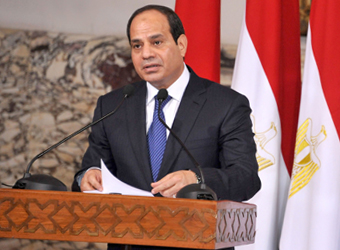Egypt issued Thursday a long-delayed investment law aimed at easing doing business and creating incentives to lure back investors after years of turmoil.
Egyptian President Abdel Fattah al-Sisi ratified the law, which cuts bureaucracy, especially for new projects, on Thursday after parliament passed it last month, a decree published in the official gazette showed.
The new incentives include a 50 percent tax discount on investments made in underdeveloped areas, and government support for the cost of connecting utilities to new projects.
“The highlight of this law is that it gives targeted incentives for investments based in geographical locations in a variety of sectors, mainly in the form of tax credits,” said Mohamed Abu Basha, an economist at EFG Hermes.
Under the law, investors can recoup half of what they pay to acquire land for industrial projects if production begins within two years.
It also restores private-sector free zones – areas exempt from taxes and customs – a policy that had held up the law’s passage because of objections to forfeiting tax revenues at a time of austerity.
Reham El-Desouki, an economist at Arqaam Capital, said the law looked like an improvement on what was there before as it sets a time cap on several bureaucratic processes, but investors will wait for more details before rushing into Egypt.
“This law is a positive development for the investment scene but the devil is in the details,” she said, adding that investors would wait to see the executive regulations that will follow.
“The general investment atmosphere is challenging, what with high interest rates and FX reforms. The Egyptian economy is still recovering,” El-Desouki said.
Direct foreign investment jumped 39 percent in the first half of the fiscal year ending in June to $4.3 billion.
Egypt floated its pound currency in November and accepted a three-year $12 billion International Monetary Fund programme tied to ambitious economic reforms, part of a bid to restore capital flows that dried up after a 2011 uprising drove away investors and tourists.
The central bank raised its key interest rates by 200 basis points on May 21 in an attempt to curb inflation of over 30 percent. It was the first rate hike since a 300 basis point increase in November.
Source: Reuters
